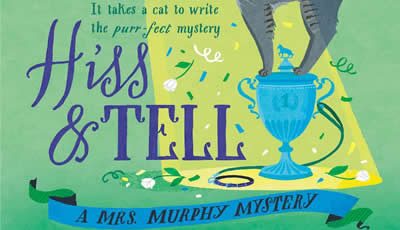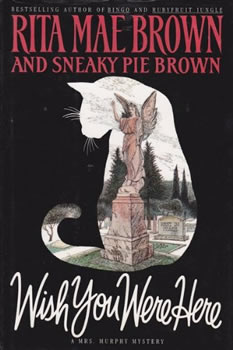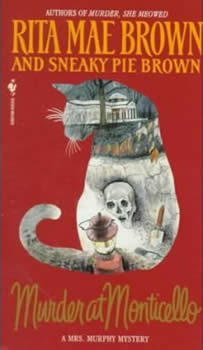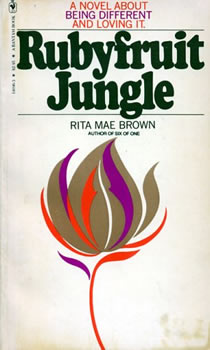

Between The Lines Between the Lines: Rita Mae Brown
An Unshakeable Foundation
By the time Rita Mae Brown became a bestselling mystery author, she’d already remade herself—and, in some ways, the world around her—several times over. She was forced out of the University of Florida in 1968 for racial justice activism and made her way to New York City; two years later, she literally stormed a National Organization for Women convention to demand that the group expand the scope of its advocacy to include gay women, working-class women, and women of color.
After that, Brown published a novel that became an instant, surprise bestseller and remains a touchstone of LGBTQ+ culture: 1973’s Rubyfruit Jungle, a critical and commercial success that landed a $250,000 paperback rights deal—more than $1.76 million in today’s market. Brown became a literary sensation and a feminist icon. By 1978, more than 300,000 copies of Rubyfruit Jungle were in print.
Brown, who had studied film in college and would later participate in the American Film Institute’s prestigious Directing Workshop for Women, moved from New York to Los Angeles, where she became an Emmy-nominated screenwriter. She might still be writing for the screen today if the 1988 writers’ strike hadn’t forced her to reinvent herself once again. When she needed a source of income that wasn’t tied to Hollywood, Brown sat down at her typewriter to try her hand at another first: a murder mystery.
The mechanics of genre fiction came easily to her. Screenwriting had taught her story structure, and she credits her education in classical literature for supplying her with the rest of a mystery writer’s toolkit. “Latin and Greek—that’s my basis,” she says. “Is not Oedipus Rex a mystery? I was so well grounded—that’s what makes writing easier for me. I’m not saying I’m good; I’m saying I have an unshakeable foundation.”
The result was Wish You Were Here, a murder mystery (ostensibly co-authored by Brown’s cat Sneaky Pie) that centers on small-town postmistress Mary Minor Haristeen and her cat, Mrs. Murphy. Once you get past the gruesome murder that kicks things off—parts of the victim are found strewn all over Crozet, Virginia—the book is a warm-hearted cozy that features Brown’s trademark humor and a cast of imminently appealing characters. It was published by Bantam with little fanfare in 1990, but by Book Three—1994’s Murder at Monticello—Bantam was sending Brown out on tour to meet her growing throngs of readers.
 She never looked back. March 2023 saw the publication of HISS & TELL, the 31st installment in the Mrs. Murphy series. Thirty-three years have passed for Brown since her mystery debut, but time has been kinder to Mary Minor (the Brown faithful know her as “Harry”) and her Crozet neighbors: “Every four Mrs. Murphy [mysteries] is a year,” Brown says of the series’ timeline. “That’s how I keep them straight in my mind, but I don’t expect anybody else to. Mary Minor is heading toward 44, and she’s changed a bit from the beginning.”
She never looked back. March 2023 saw the publication of HISS & TELL, the 31st installment in the Mrs. Murphy series. Thirty-three years have passed for Brown since her mystery debut, but time has been kinder to Mary Minor (the Brown faithful know her as “Harry”) and her Crozet neighbors: “Every four Mrs. Murphy [mysteries] is a year,” Brown says of the series’ timeline. “That’s how I keep them straight in my mind, but I don’t expect anybody else to. Mary Minor is heading toward 44, and she’s changed a bit from the beginning.”
Brown, whose writing routine is to simply “sit down and let it rip,” talks about her characters as if they’re childhood friends. “You can’t fault him,” she says of Harry’s husband, Fair, and the couple’s on-again, off-again marriage. “All they knew were one another—they were high-school sweethearts. They love one another, and it’s fine. He’s not going to change her and she’s not gonna change him, which I think is the key to any relationship. I like them, and I know there’s more in the future.”
If the past is any indication, that future will include an ever-growing lineup of characters as Crozet’s population expands (and contracts—there’s a lot of murder in the otherwise quaint Southern hamlet). Back in 1990, the cast of characters in Wish You Were Here was four pages long; in HISS & TELL, it takes nine pages to list all the players, both human and otherwise.
 “Oh, I just think of it as a big party,” Brown says of managing such a sprawling cast. “And more and more people are coming to the party, but you’ve got to remember their names or you’re not a good host. I like them—I even like the ones I don’t particularly like, if that’s possible. I think a writer is a thief of souls. You have to inhabit that individual and try to bring them to life, even if they’re completely different from you. The great thing about that process is I think ultimately you do begin to understand different people, including those we consider evil. Does that mean you’re saying it’s okay? No, not at all. But you can see where people go off the rails, and you begin to understand, you know, it can happen to any of us. In other words, I don’t think I’m remotely superior to my characters.”
“Oh, I just think of it as a big party,” Brown says of managing such a sprawling cast. “And more and more people are coming to the party, but you’ve got to remember their names or you’re not a good host. I like them—I even like the ones I don’t particularly like, if that’s possible. I think a writer is a thief of souls. You have to inhabit that individual and try to bring them to life, even if they’re completely different from you. The great thing about that process is I think ultimately you do begin to understand different people, including those we consider evil. Does that mean you’re saying it’s okay? No, not at all. But you can see where people go off the rails, and you begin to understand, you know, it can happen to any of us. In other words, I don’t think I’m remotely superior to my characters.”
At 78, Brown spends her mornings working her farm in Afton, Virginia, and her afternoons writing. On the day she spoke to The Big Thrill, she had been up since 4:30 a.m., tending to her horses, chickens, and cattle. If she was tired, it didn’t show; during the two-hour talk, the conversation ranged from seismic shifts in the publishing industry to the French Revolution to classical languages. There were anecdotes from her years in Hollywood and deeply personal remembrances of her childhood in Pennsylvania and Florida. Interviewing Brown isn’t so much a process as an experience, and it’s a two-way exercise. Brown asked at least as many questions as she answered.
 And if you think she means to slow down soon, you must be thinking of a different writer. She intends to keep up her grueling two-books-a-year schedule—a pace mandated by a publishing industry that’s both rapidly changing and confoundingly stubborn.
And if you think she means to slow down soon, you must be thinking of a different writer. She intends to keep up her grueling two-books-a-year schedule—a pace mandated by a publishing industry that’s both rapidly changing and confoundingly stubborn.
“I didn’t use to work like this, but ebooks upended my life and every other writer’s,” Brown says. “I sell more books than I ever have in my life, but I get [less money per book]. If you buy my ebook, I get 30 cents. If you buy my book at Barnes & Noble, I get $2. So you just work harder. But I think, ultimately, many of us will have to completely regroup unless publishing changes. A book still sells the way it did when Gutenberg first printed. Random House can juice up the sales with lots of ads, and that lasts for maybe two or three weeks. After that, it’s still word of mouth.”
Book 15 in Brown’s Jane Arnold foxhunting mystery series is due out in October 2023, and she’s hard at work on the next Mrs. Murphy mystery. Changes are coming for Mary Minor; Brown hints that at least one human character and probably some animal ones will make their exits soon, though she assures readers that the four-legged stars are safe.
Whatever changes and challenges are coming for Crozet, though, Brown insists her characters will face them with wit, love, and grace. “I can’t write books about [child abuse] and being brutalized—those books need to be written, but that’s not what I can do,” Brown says. “I can write books about people trying to solve problems, no matter what’s happening to them. And I want to make you laugh. If I make you laugh, your defenses are down and maybe you begin to see how goddamn absurd the situation is in the first place. I don’t have to sit there and hector you for a chapter about how terrible this is, and how wrong you are not to be on the front lines. What kind of bullshit is that? I want you to look at it and say, You know, I’ve seen that, or Yeah, I’ve thought that. I guess I want people to see themselves and to realize we’re all more alike and different.”
- Between the Lines: Rita Mae Brown - March 31, 2023
- Between the Lines: Stephen Graham Jones - January 31, 2023
- Between the Lines: Grady Hendrix - December 30, 2022


